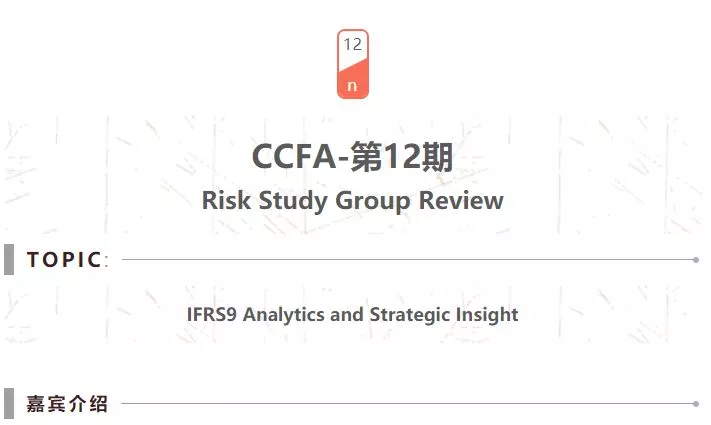
On March 7, 2019, CCFA Risk Study Group launched its 12th study session on the topic of International Financial Reporting Standard (IFRS) 9. Yicent Chen, VP in BMO Capital Markets, was the host of the study session. It was our great honour to invite Chris Wood, Partner in PwC, Dianna Zhang, VP of Global Risk Management in Scotiabank, and Attila Kovacs, Director in PwC, as our speakers.
2019年3月7日,CCFA风险学习小组开展了第12次的学习讨论会,以国际财务报告准则IFRS9为主题。这次的学习讨论会由蒙特利尔银行的资本市场副总裁 Yicent Chen 担任主持人。我们非常荣幸邀请到了普华永道合伙人Chris Wood,丰业银行全球风险管理副总裁Dianna Zhang和普华永道董事Attila Kovacs担任我们的发言人。

Since the implementation of IFRS9 accounting standard, there has been an increasing attention on what the impact of the new standard is. In this study session, the speakers discussed the key areas that IFRS9 will have potential impact on, and introduced how analytics can help to study the impact. The presentation was led by Attila with valuable comments from Chris and Dianna based on their experiences on various IFRS9 related projects.

自IFRS9会计准则实施以来,新准则的影响受到越来越多的关注。在本次研究会议上,发言人讨论了IFRS9对于关键领域的潜在影响,并介绍了如何利用数据分析软件例如Tableau研究IFRS9的潜在影响。本次会议由Attila主导,由具有多个IFRS9相关项目经验的Chris和Dianna提供宝贵意见。

In order to more effectively understand the strategic effect of IFRS9, we should look at the impact on allowance, earning and capital all together. It is expected that IFRS9 impairment requirements will likely increase income statement volatility, although the volatility has not been experienced yet as we are operating at a macroeconomic benign period. It should be cautious if the volatility is less than that with the incurred loss model, then actions needs to be taken in future model development.

为了更有效地了解IFRS9战略性的影响,我们应该综合考虑IFRS9对于准备科目,盈利和监管资本的影响。我们预计IFRS9对于减值的要求可能会增加盈利的波动性,尽管我们目前处于宏观经济的良性时期尚未经历大幅度的波动。值得注意的是如果波动率小于已发生损失模型中的波动率,我们需要在未来的模型开发中采取必要的行动做出调整。

The key areas of IFRS9’s impact are data management, credit risk management, portfolio strategy, and capital dynamics. For data management, improving data quality is crucial for developing models with more accurate prediction. For credit management, IFRS9 requires more proactive and forward looking credit risk models. For portfolio strategy, IFRS9 impact can be drilled down more deeply into specific business unit or portfolio, and therefore affects future business decisions. For capital dynamics, the financial institutes would consider the impact of IFRS9 and revisit their risk appetites under BASEL requirement and potentially adjust capital planning and allocation. Other considerations of IFRS9 impact are on stress testing and forecasting including adjustment of scenario weights; model risk management by massively enlarging model inventory; and managed services including potential model validation automation and outsourcing.

IFRS9影响的关键领域包括数据管理,信用风险管理,银行业务的策略和监管资本。对于数据管理,提高数据质量对于开发具有更准确预测的模型至关重要。对于信用风险管理,IFRS9需要更前瞻性的信用风险模型。对于银行业务条线的策略,IFRS9深入地影响到各个细分特定业务单位或业务条线,从而影响未来的业务决策。对于监管资本,金融机构可以考虑IFRS9的影响,并重新审视其在BASEL要求下的风险偏好,调整资本规划和资本的分配。 IFRS9影响的其他因素包括对于未来的预测和压力测试,包括调整情景分析中因素的权重;扩大模型库来管理模型风险;以及牵涉到的各种服务,包括潜在的模型验证自动化服务及外包服务。

The second part of the discussion introduced Tableau Software as an effective and useful data analytics and visualization tool for understanding IFRS9 impact. It has user-friendly interface with powerful features such as connecting the expected credit loss (ECL) with earning and profit with various simulated scenario change from baseline to stress; nice visualization package and dynamic functions for quick dive-in analysis. This analytic tool helps to increase understanding of portfolio sensitivities and how provisions would evolve under various scenarios; provide more granular and improved understanding of portfolio risk profiles, loss contributions, and profitability; increase confidence in the capital assessment used to steer management actions and financial planning within the business; improve accuracy of capital assessments and adapt to more sophisticated regulatory requirements and results in better risk management.

讨论的第二部分介绍了如何利用Tableau作为一种有效且实用的数据分析和可视化工具,来理解IFRS9产生的影响。Tableau具有友好的界面,强大的功能例如在各种情景下模拟预期信用损失与盈利的变化;良好的可视化性以及利于快速分析的动态展示功能。Tableau的分析有助于加强对于银行各项业务条线敏感性的理解,展示各种情况下拨备的变化;展示银行各项业务条线的风险概况、损失以及盈利能力;改善用于指导企业内部管理和财务规划的监管资本的评估;加强监管资本评估的准确性以适应更复杂的监管要求,从而改善风险管理。

We received positive feedbacks from the audience about the study session, and will look forward to the next CCFA risk study session upcoming in May. In the end, we would like to thank PwC for sponsoring the venue and food for the lunch and learn session.

会后我们收到了CCFA风险小组成员对本次学习会议的积极反馈。我们期待5月份即将举行的下次CCFA风险学习会议。最后,我们要感谢普华永道赞助本次会议的午餐和场地。
After-session Insights:
Dianna shared her thought that the current state in IFRS 9 implementation focuses on incorporating PCL and ACl into financial planning and forecasting, conducting sensitivity and scenario analysis. The outlook for the future impact on the industry is to consider hedging and proactive managing.
Next CCFA Risk Study session is tentatively scheduled as below:
Topic: Liquidity Risk Management
Presenter: Ed Medeiros, Managing Director, Group Liquidity & Global Cash Management, Group Treasury
Date: Friday, May 31, 2019
Time: 12:00 pm - 1:00 pm
Place: MacLeod - 63rd floor, Scotia Plaza

CCFA 风险管理群群主:
Yicent Chen, VP, BMO Capital Markets

Photographer: Di Wang

